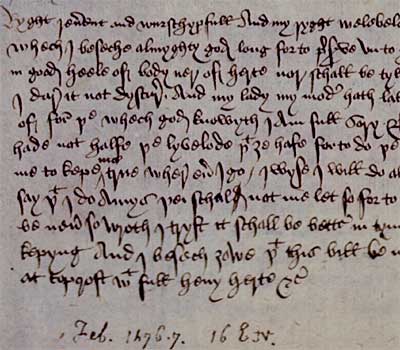Funeral of Sir John Paston
One of the greatest sources for the writing of English social history for the fifteenth century is that collection of the correspondence of a Norfolk gentry family, known as the “Paston Letters.” (A look at the sample of Paston handwriting above will tell you why I chose to base my early-modern English research on printed sources.) In 1466 Sir John Paston, the head of that wealthy family, died; Chamber’s Book of Days records interesting notes about the funeral.
The body of Sir John was conveyed, for interment, to the Priory of Bromholm, in the parish of Barton, a little village on the north-cast coast, and within sight of the sea. A curious roll of accounts of the expenses of the funeral is preserved, from which we gather that for the feast, during three continuous days, one man was occupied in flaying beasts: and provision was made of thirteen barrels of beer, twenty-seven barrels of ale, one barrel of beer of the greatest assize, and a runlet of red wine of fifteen gallons.
All these, however, copious as they seem, proved inadequate to the demand: for the account goes on to state that five coombs of malt at one time, and ten at another, were brewed up expressly for the occasion. Meat, ton, was in proportion to the liquor: the country round about must have been swept of geese, chickens, capons, and such small gear, all which, with thirteen hundred eggs, thirty gallons of milk, and eight of cream, forty-one pigs, forty calves, and ten ‘nete,’ slain and devoured, give a fearful picture of the scene of festivity within the priory walls. Amongst such provisions, the article of bread bears nearly the same proportion as in Falstaff’s bill of fare. On the other hand, the torches, the many pounds weight of wax to burn over the grave, and the separate candle of enormous stature and girth, form prodigious items. No less than £20 was changed from gold into smaller coin that it might be showered amongst the attendant throng; and twenty-six marks in copper had been used for the same object in London, before the procession began to move. A barber was occupied five days in smartening up the monks for the ceremony: and ‘the reke of the torches at the dirge’ was so great that the glazier had to remove two panes to permit the fumes to escape.

I had something similar in mind for my own funeral…..
Bob, please include some roughage in the fare for your mourners. The entire Paston neighbourhood must have been constipated for a month after that meat-heavy feast.